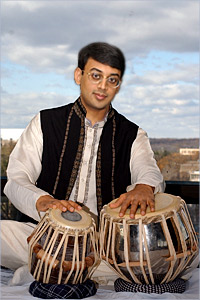|
|
|
|
|||||
photo: Denise Applewhite
|
Accomplished young mathematician brings passion to many interests by Steven Schultz A rhythm rolls forth -- enveloping, evolving, precise and melodic. His boyish face glows with delight. He has come, in traditional Indian dress, to the top floor of Fine Hall to have his picture taken as he plays. For a few minutes, his office one floor below seems far away, but the spark behind his wire-rimmed glasses is the same one that flashes other times when he describes his math and the beauty of ideas that fit together like parts of a musical score.
Bhargava, 28, joined the Princeton faculty this fall as a full professor of mathematics, one of the youngest ever to receive that rank, and brings passion to many pursuits. In addition to his math and music, Bhargava is committed to teaching and has ambitious plans for developing new introductory math courses that broaden the subject's appeal. He also has written articles to popularize math for a general audience and published research in the field of linguistics. "He is an amazingly talented young guy," said Professor of Mathematics Peter Sarnak, who has worked with him since Bhargava was a graduate student at Princeton from 1996 to 2001. Bhargava's varied interests build on one another, but not always directly. Classical Indian music is very mathematical, but consciously thinking of the math would interfere with the improvisation and emotion of the playing, Bhargava said. "But somehow the connection is there. I often use music as a break, and many times I come back to the math later and things have cleared up," he said. Even when he is working on his research, mathematics is not necessarily on his mind. "I am always working on lots of things at once," he said. "I like to move between different areas. "Often I am not thinking about any particular problem at all," he added. "I am just thinking, wherever it leads. Often the problem being solved emerges only later." Read the full story. |
||||||
|
University home | Princeton Web pages A-Z | Search
Previous caption pages | Communications Office | Web page feedback © 2004 The Trustees of Princeton University |
